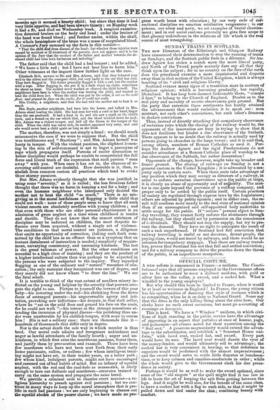SUNDAY TRAINS IN SCOTLAND.
Tun new Directors of the Edinburgh and Glasgow Railway have announced their determination to stop the running of trains on Sundays, and the Scottish public feels in a dilemma. Sir An- drew Agnew has stolen a march upon the more liberal party, and North of the Tweed people scarcely dare say all that they think upon the subject ; for in no country on the face of the earth does the priesthood exercise a more inquisitorial and despotic sway than in that section of the United Kingdom, which is always boasting of its "civil and religious liberty:" Scotland evinces many signs of a transition state in matters of religious opinion; which is becoming gradually, but rapidly, liberalized. It has long been deemed fashionable there, "comae it faut," to belong to the Church of England. Doubts as to the real piety and morality of ascetic observances gain ground. But the party that entertain these sentiments has hardly attained the advancement that would embolden it to speak out : men mistrust, not each other's convictions, but each other's firmness to declare convictions.
Thus, instead of directly attacking that compulsory observance of sectarian rules which the closing of the railway would be, the opponents of the innovation are busy in trying to show that it does not facilitate but hinder a due observance of the Sabbath. There appears to be no doubt that the railway is actually used by persons going to churches in the large towns ; and it is said that, among others, numbers of Roman Catholics so used it. Per- haps Sir Andrew Agnew and the rigid Presbyterians do not consider attendance at a Roman Catholic place of worship to be due observance of the Sabbath, but rather desecration Opponents of the change, however, might take up broader and firmer ground. The closing of railways on Sunday is not general custom in the United Kingdom ; it is advocated by a ma- jority only in certain sects. When those sects take advantage of any position which they may occupy as directors of a railway, in order to enforce sectarian observances upon the public at large, it is clearly an abuse of opportunity and of authority. The mat- ter is one quite beyond the province of a rail company, and proper only to be settled by the public itself. Certain practices of society are regulated through express laws by the Legislature; others are adjusted by public opinion ; and in either case, the re; suit will conform more nearly to the real state of national opinion than if an unrecognized and self-appointed body undertake to settle usage for the public. If '' serious " persons object to Sun- day travelling, they cannot fairly enforce the abstinence through the railway, but they should act by persuasion on the consciences of individuals. They should not atop the supply, but try to pre- vent the demand. They have no right to anticipate the result of such a task unperformed. If Scotland bad full conviction that railway travelling is sinful or not decorous, decent people, the paying class, would not travel by railways, and there would be.no occasion for compulsory stoppage. That there are railway travel- lers, proves that Scotland has not that full and settled conviction; and for a railway company. to drive the practice down the throat of the public, is an impertinent usurpation.


























 Previous page
Previous page